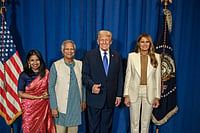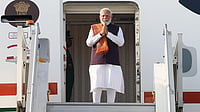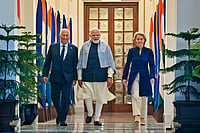Sher Bahadur Deuba leader of the Nepali Congress is the new Prime Minister of Nepal. What will a Deuba government mean for India? Will he also play the China card against India, like his predecessor Khadra Prasad Sharma Oli?
Whenever Oli was in trouble politically at home, he would rustle up anti-India feelings and get the people behind him. The nationalist card is a favourite of most political leaders. Oli had used the China card effectively during elections. He was also responsible for starting a cartographic war with India at the height of the Ladakh face-off between India and China, to outfox those who challenged him inside the ruling Communist Party of Nepal. But in the end, Oli was turning more and more towards India and using the Hindu card as he wooed the monarchy as in most of rural Nepal the king continues to be revered.
In fact, Mahesh Basnet, a protégé of Oli created quite a flutter in political circles when he raised the issue of reviewing the Republican Constitution’s provisions on federalism and secularism. The issue was raised by Basnet during the CPN-UML’s (Communist Party of Nepal- Unified Marxist Leninist) Central Committee meeting. He claimed that the PM has agreed to hold conversations on the matter. These are two of the fundamentals of the 2015 Constitution. Monarchy had been abolished in Nepal thanks to the Maoists, who were also backed by many within the Nepali Congress. However now all this will take a back seat as Oli has been removed from his post.
Despite all his machinations prime minister KP Sharma Oli with the help of loyalist President Bidhya Devi Bhandari had to finally quit after the Supreme Court verdict. A five-member Constitutional Bench of the country’s apex court reinstated Nepal’s lower house while delivering a verdict on a writ petition filed by 146 united opposition lawmakers. Not just that, but the Court directed the President to appoint Deuba as the next prime minister. He would have to prove his majority in the House within a month.
Oli will certainly try his best to ensure that Deuba loses the confidence vote, but as of now, the wily former prime minister is on the back foot. Squabbling among Nepal fractious politicians will continue for some time, but there will be no large-scale unrest as Nepal witnessed during the civil war when the Maoists tried to overthrow the monarchy through violence.
Deuba, the President of the Nepali Congress, has been prime minister four times earlier. He was PM through the reign of King Birendra, and again after his brother King Gyanendra’s coup in 2005. He led Nepal during the interim governments after the peace accord in 2006.
In the past, the Nepali Congress was regarded as a party close to India. The Indian establishment knows him well, and he is unlikely to rock the boat. However, the situation in Nepal has also changed. China cannot be wished away. Deuba too will look to Chinese investments in Nepal and try to maintain the country’s growing ties with Beijing. Nepal has signed on to China’s ambitious Belt and Road Initiative.
However, unlike in the recent past when Hou Yanqi, the Chinese ambassador to Nepal got actively involved in brokering peace between the two factions of the ruling Communist party, Beijing will try to keep a lower profile. Despite all China’s efforts Oli and his main rival Pushpa Kamal Dahal refused to bury the hatchet.
India too was actively involved in Nepalese politics before. But it has also learnt a lesson and is lying low. India’s active interference drew a lot of flak from the public in Nepal, more so when anti-India feelings were at their height after the 2015 blockade.
Daube will try to maintain good relations with India. It will be interesting to see whether he sticks to the tradition of making New Delhi his first foreign visit. Oli too followed that unwritten protocol.


























